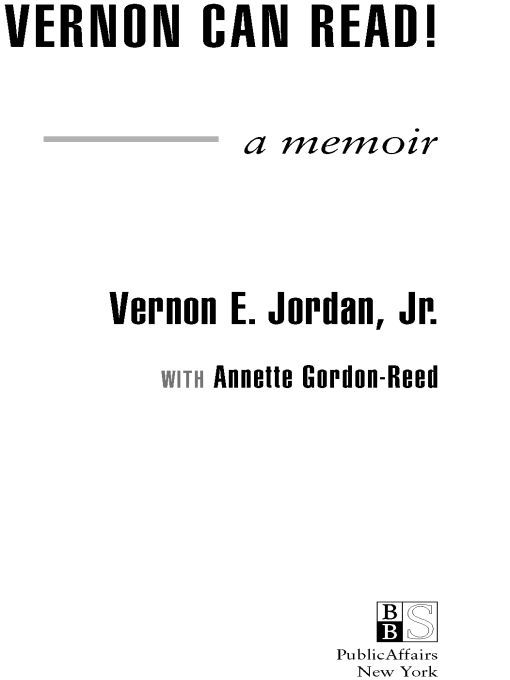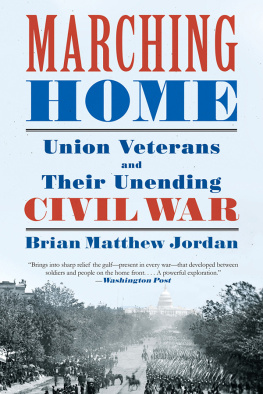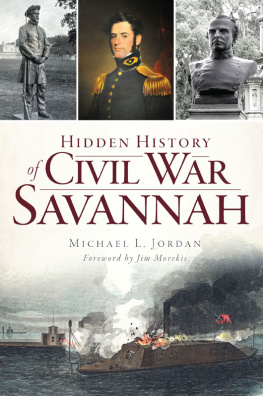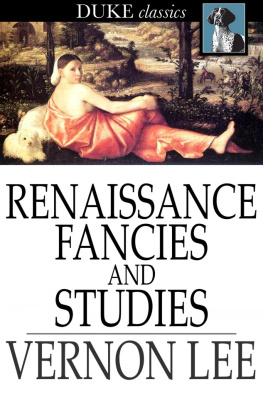Table of Contents
Vernon E. Jordan, Jr., one of the major civil rights figures in American history, is a senior managing director of the investment firm Lazard Frres & Co., LLC and a senior counsel to the law firm of Akin, Gump, Strauss, Hauer & Feld. He lives in Washington, D.C.
Annette Gordon-Reed, a graduate of Dartmouth College and Harvard Law School, is a professor at New York Law School. She is the author of Thomas Jefferson and Sally Hemings: An American Controversy. She lives in New York City.
TO THE MEMORY OF
MY MOTHER AND FATHER,
WHO TAUGHT ME SO MUCH
AND TO MY GRANDCHILDREN,
WHO I HOPE WILL BE INSTRUCTED
AND INSPIRED BY THIS EFFORT
INTRODUCTION
IN THE SUMMER OF 1955, at the end of my sophomore year in college, I worked as a chauffeur in my hometown of Atlanta, Georgia. It had not been my first choice of jobs. I was originally supposed to work as a salesman for the Continental Insurance Company, which had made me an offer during a campus interview at my school, DePauw University. When the interviewer said there was an opening for me in the companys Atlanta office, I jumped at the chance. It was the perfect arrangement for me. I would have a job in the place where I most wanted to beat home in Atlanta. At the end of the term, brimming with the confidence of a young man with two years of college behind me, I packed my bags and headed south thinking everything was in place.
After a few days settling in with my family, I put on my best suit and headed downtown to the Fulton National Bank Building, where Continental had its offices. I went up to the receptionists desk to present myself.
My name is Vernon Jordan, I said. Im a student at DePauw University, and Im here to begin my summer internship.
The receptionist seemed in need of a translator to help clarify what I had just said. She was, at that moment, like a machine whose gears had ground to a halt and was struggling to get restarted. When she finally realized shed heard what she thought shed heard, she called for the man in charge of summer workers. You wont believe this, she told him, but theres a colored boy out here who says hes a summer intern.
The supervisor, a tall fellow who looked to be in his mid-thirties, came out. I introduced myself.
Im Vernon Jordan. I was hired to be a summer intern in your office.
His reaction was not unlike the receptionists. But he quickly composed himself and took me inside his office. An awkward moment passed before he said, They didnt tell us.
They didnt tell you what? I asked, even though I suspected where he was heading.
They didnt tell us you were colored, he replied. At that time in history, we had not yet become black.
He went on. You know, you cant work here. Its just impossible. You just cant.
Of course, segregation was still very much a fact of life in Georgia in the summer of 1955. I was well aware of that, and of the rules that were still propping up the system. But I had thoughthopedduring those months after my interview that I had somehow made my way around them. It was my policy then, and it remains the same today, never to expect defeat before making an honest effort. Also, by then Id come to think of Jim Crow as a lame horse that was about to be put down. The feeling was in the air. And I wanted to do whatever I could to help speed the process along. But it wouldnt happen on that day at the Continental Insurance Company.
Although I was disappointed, I knew there was nothing to be done about the situation at that particular moment. As I got up to go, my never-to-be-supervisor, not wanting to leave things as they stood, said, Ill tell you what Ill do. Im going to call J. L. Wolfe Realty. We do business with them sometimes, and we can see if they can give you an office.
While Continental was willing to honor its commitment to hire me, under no circumstances could I sit in its offices as an employee. J. L. Wolfe Realty, a black-owned real estate and insurance business on Auburn AvenueSweet Auburn, the heart of Atlantas black business districtwas the proposed solution.
The Continental representative called Wolfe Realty and explained the situation. The head of the company agreed to give me an office out of which I sold Continentals income-protection insurance policies to black businesses employing five or more people. On occasion, my white supervisor came down to my office to make calls.
It was absurd. As a black person, I could not sell the policies of a white company to black businesses while sitting in the white companys office. Yet my white supervisor could come in to the black business office and sell the white companys policies to black firms. This was a prime example of the craziness, the backwardness, the inefficiency of Southern life.
The job was also very boring. Although I managed to sell some individual policies (mainly to my mothers friends), I couldnt muster even a minimal interest in my work. My lack of enthusiasm certainly didnt help when it came time to sell policies to people who were not friends of the family.
When I could stand it no longer, my mother, who knew I was deeply unhappy, suggested an alternative. The summer was passing, and the opportunities for other office jobs had dwindled. I wanted to work. So why not, she asked, work the balance of the time using other skills I had? I was a good driver and, like many young men in the 1950s, I was in love with cars. My mother ran a catering business, which meant she had contacts within most, if not all, the prominent white households in Atlanta.
That is how I became a chauffeur for Robert F. Maddox.
Robert Maddox was one of the leading figures in Atlantas white elite for most of the early part of the twentieth century. He was mayor of the city in 1910, and before that he had been active in the civic and social affairs of the town. A man of finance, he was the president of the First National Bank of Atlanta and president of the American Banking Association. Maddoxs interests and influence were wide-ranging. He had a fabulous garden on his grounds and was, for a time, the president of the Garden Clubs of America.
In many ways Maddox was a symbol of the New Southopen to business and economic development and devoted to progress, as long as it was within certain boundaries. When Booker T. Washington gave his famous Atlanta Exposition address (sometimes called the Atlanta Compromise), Maddox had been among the dignitaries on the platform, listening while the wizard of Tuskegee assured whites that blacks would make no immediate press for social equality.
Maddox was very proud of having built the first very large home in Buckhead, one of Atlantas most exclusive neighborhoods. When I encountered him, he was well into his eighties, a widower living alone in that spectacular house, attended by a small group of servants: Joe, the chauffeur and butler, whose place I took for the month of August, when he was away; Lizzie, the cook, a middle-aged woman who played the piano at the Mount Zion Baptist Church; and Troy, the yardman.
Every morning I picked up Lizzie and brought her to work. If needed, I would then press one of Maddoxs Palm Beach suits as Lizzie fixed his breakfast. When she finished doing that, she would take the meal up to Maddox and then return to prepare my breakfast, which I ate in the butlers pantry. Lizzie also made breakfast for Troy. But Troy worked in the yard and, according to age-old protocol, was not allowed to eat inside the house. His meal was handed out to him by Lizzie, and he sat on the back porch of that huge Southern house and had his breakfast.



















